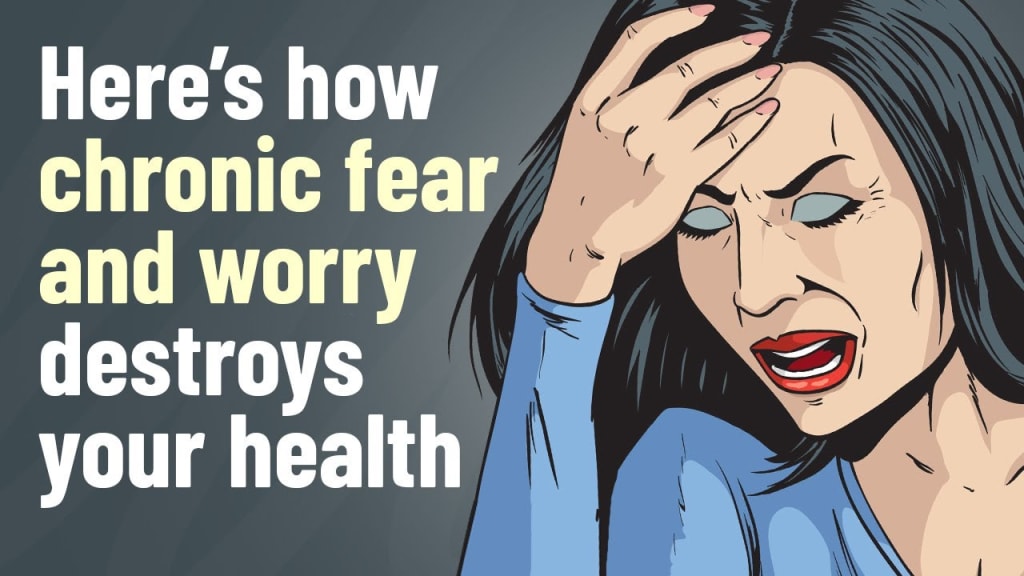12 Ways Chronic Fear Is Harming Your Health
Fear is a natural human emotion that kicks in when you sense a threat and causes your body to respond with a fight or flight response. Fear helps keep you safe. But when it becomes chronic and consumes you, day in and day out, it can be debilitating. Chronic fear is when the stress response gets stuck in the “on” position and the body never gets a chance to return to homeostasis (the state of equilibrium in which all systems function normally). This can lead to mental and physical health issues. In this video, we explore how chronic fear affects you and what you can do to break free from it and get back on track.

12 Ways Chronic Fear Is Harming Your Health
Fear is a natural human emotion that kicks in when you sense a threat and causes your body to respond with a fight or flight response. Fear helps keep you safe. But when it becomes chronic and consumes you, day in and day out, it can be debilitating. Chronic fear is when the stress response gets stuck in the “on” position and the body never gets a chance to return to homeostasis (the state of equilibrium in which all systems function normally). This can lead to mental and physical health issues. In this video, we explore how chronic fear affects you and what you can do to break free from it and get back on track.
Number 1 - It Weakens Your Immune System Your immune system is designed to protect you from bacteria, viruses, and other foreign invaders. It also helps heal wounds and fight infections. However, chronic fear can weaken this natural defense mechanism. And that’s because fear causes your body to release a flood of stress hormones, including cortisol and adrenaline. When your body is exposed to these hormones for a prolonged period of time, its ability to fight against viruses, infections, and other illnesses is compromised. This leaves you more susceptible to illness.
Number 2 - It Can Lead to Cognitive Dysfunction If you’re living with chronic fear, your mind is constantly racing with negative thoughts about the future and what might go wrong. Thus, it can be hard to focus on anything else. The fight or flight instinct causes you to lose your ability to concentrate which, in turn, can affect your daily activities. This means having trouble thinking clearly, remembering things, paying attention to details, and solving problems. Additionally, fear can lead to a decline in motivation and energy, further impairing your cognitive functioning.
Number 3 - It Can Cause Anxiety and Panic Attacks When you have chronic fear, it can lead to an increase in anxiety and panic attacks. Anxiety is characterized by a feeling of worry or uneasiness that may be accompanied by physical symptoms such as rapid heartbeat, sweating, and muscle tension. Panic attacks are periods of intense fear or terror that occur suddenly and without warning. During a panic attack, you may feel like you’re losing control or going crazy. You might even feel like you’re having a heart attack or going to die.
Number 4 - It Can Prevent You from Relaxing When you’re afraid, it can be hard to relax. Your heart beats faster, and your body goes into fight-or-flight mode; you’re just not able to calm down. Chronic fear also makes it hard for you to get a good night’s rest. First, it makes it difficult for you to unwind at the end of the day; and second, it can make you more likely to have nightmares. This combination often leads to insomnia.
Number 5 - It Impairs Digestion The same hormones that cause the body to tense up and go into fight or flight mode, also disrupt the normal digestion process. This causes the digestive system to slow down and be less efficient, decreasing overall nutrient absorption. Furthermore, fear can cause an increase in acid production, resulting in stomach pains and indigestion.
Number 6 - It Can Cause Premature Aging The stress of chronic fear can make your skin look old and wrinkled due to all that excess cortisol. Cortisol affects the production of collagen (the main component of skin that affects its elasticity and suppleness). Too much cortisol can break down collagen faster than it can be replaced, leading to wrinkles, dry and dull skin, age spots, and other signs of premature aging.
Number 7 - It Can Deplete Your Confidence Levels Confidence is an integral part of self-esteem and well-being. It gives you the ability to face the day with positivity, knowing that you can handle whatever comes your way. But when fear takes over, it can be hard to feel confident in yourself or your abilities. You may also feel like you’re constantly trying to prove yourself to others, and this leads to feelings of inadequacy.
Number 8 - It Might Lead to Avoiding Things That Are Good for You When you are afraid of something, naturally, you try to avoid it. This can be a good strategy if the thing you’re afraid of is dangerous. But when it comes to chronic fear, avoidance can make your life worse because it also prevents you from doing things that are good for you and could help you feel better. For example, you might not go to the doctor when you feel sick because you’re afraid of what they might discover; or you may avoid new experiences out of fear of getting hurt.
Number 9 - It Disrupts Hormone Levels When you have chronic fear, cortisol levels remain elevated, triggering a cascade of physiological changes that disrupt the delicate balance of hormones in the body. This disruption can lead to increased levels of catecholamines, which can further heighten feelings of anxiety and fear. Additionally, chronically elevated cortisol levels can interfere with the production of hormones like progesterone, estrogen, and testosterone, causing a variety of health issues, such as infertility, low libido, and adrenal fatigue.
Number 10 - It Can Cause You to Develop Phobias If your fear often revolves around the same objects or situations, over time, this fear can become a phobia. When this happens, you may be afraid of anything that is related to the original triggers. Phobias can be debilitating and can have a significant impact on your life. You may find yourself avoiding certain places or activities that trigger your fear, leading to a diminished quality of life.
Number 11 - It Can Trigger Depression When you’re constantly worrying about what could go wrong, it’s no surprise that chronic fear can trigger depression. It’s like you’re constantly weighed down by a heavy burden that you can’t seem to shake. You feel overwhelming sadness, moodiness, and fatigue, all of which can be debilitating. You may also find yourself unable to engage in activities you once enjoyed, and it can also affect your relationships.
Number 12 - It Causes Cardiovascular Damage Chronic fear can cause cardiovascular damage as a result of the body’s increased production of stress hormones, which lead to elevated heart rate and blood pressure, causing a strain on the heart muscles. Over time, this also causes a rise in cholesterol levels and fatty deposits in the arteries, resulting in atherosclerosis, or hardening of the arteries. This restricts blood flow to the heart, and can cause a heart attack or stroke. Long-term chronic fear can also cause changes in the heart’s electrical signals, raising your risk of abnormal heart rhythms.
When living with chronic fear, it’s important to understand that the fear is not necessarily rational or logical. It’s simply a feeling that you can’t shake. It can be overwhelming and can prevent you from taking risks and engaging in activities that could be beneficial for you. The good news is that there are ways to manage chronic fear. First and foremost, it’s important to understand that it’s OK to feel scared. Acknowledge and accept your fear, and then take small steps to face it.
Just be patient and gentle with yourself during this process. It can also be helpful to reach out to a mental health professional if your fear is affecting your daily life. They can help you address the root cause of your fear and provide guidance on how to manage it. Talking to trusted friends and family can be beneficial as well. After all, it’s important to have a support network that you can turn to when you’re feeling overwhelmed.
About the Creator
Enjoyed the story? Support the Creator.
Subscribe for free to receive all their stories in your feed. You could also pledge your support or give them a one-off tip, letting them know you appreciate their work.






Comments
There are no comments for this story
Be the first to respond and start the conversation.